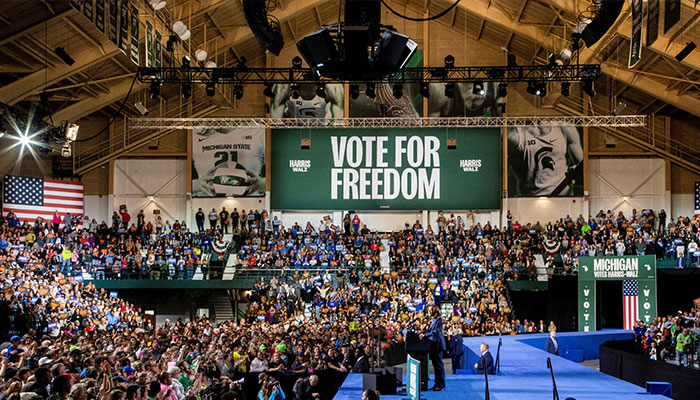
Paris: The vote of more than half the world’s population in the 2024 elections has left many liberal democracies facing crises of confidence, political fragmentation and growing polarization, with some observers fearing a new wind in the sails of authoritarianism.
The November election in the United States, which describes itself as a “shining city on a hill” for democracy, was the top of a busy election year, with Donald Trump emerging victorious.
Many post-vote analyzes have focused on the economic drivers of public rejection of Democratic incumbents.
Trump’s repeated threats to undermine the rule of law appear to have done little to discourage voters.
The Republican vowed to subjugate the justice system that targeted him with multiple investigations and prosecutions, punish hostile media outlets and even name civil servants based on their ideological allegiance.
Political scientist Larry Diamond wrote in Foreign Affairs that if Trump did everything he said he would, “the United States would witness the most severe assault on checks and balances and civil liberties in its peacetime history.”
Polarized and fragmented
“We are at a dangerous moment, not just in the United States but in many other places,” said Max Bergman of the Center for Strategic and International Studies (CSIS). Agence France-Presse.
Over the past two decades, the Western democratic model consolidated since 1945, then consolidated following the collapse of the Soviet bloc after 1989, has been in a weakened position.
Freedom House, a US-based organization, has highlighted the increasing violence and suspected or confirmed manipulation in several elections around the world.
Elsewhere, some so-called “hybrid” regimes have seen powerful incumbents retain their positions but face determined, organized and new opposition.
Narendra Modi in India and Recep Tayyip Erdogan in Türkiye suffered setbacks in the legislative and municipal elections, respectively.
Even in the most competitive democracies, such as in Europe, “we are seeing increasingly polarized and fragmented politics,” Bergman said.
Germany’s ruling coalition between the Social Democrats, Greens and Liberals collapsed this month, with little clarity on what the new government will look like after new elections in February.
In neighboring Netherlands, a fragile four-party coalition faces internal division as it tries to stay afloat after the collapse of the previous government in 2023.
France, where monolithic left-right parties have alternated in power for decades, has seen its political landscape shattered since centrist Emmanuel Macron came to the presidency in 2017.
His surprise electoral upset in the summer produced a parliament almost evenly divided between three blocs – a united left, centre-right and far-right.
In light of the ongoing disagreements between all parties on almost every issue, reform efforts have been paralyzed.
“Stop changing”
Bertrand Badie, an expert in international relations at the French University of Sciences Po, said that the turbulent state in which Western democracies are experiencing can be explained by “a crisis of confidence in political parties and the media that has not been seen since 1945.”
He added that voters were reacting to “the dryness of what is on offer in politics.”
“What was Macron or Kamala Harris offering in France or in the United States other than preventing their rivals – Trump or the far-right led by Marine Le Pen – from seizing power? This creates a big problem in terms of legitimacy.”
Challenging traditional parties and incumbents has increased the appeal of populist parties and the far right.
They made significant gains in the European elections that took place in June, as we saw in the votes in Germany, France, and the Netherlands, as well as in Italy and Hungary before 2024.
Many voters choose politicians who promise tougher action on issues including immigration and purchasing power.
Personality is also vital, as Hungarian presidents Viktor Orban and Trump have been able to demonstrate uncompromising authority.
“The world and societies are going through a major transformation. Liberal globalization has not provided answers for millions of people who are concerned about sometimes radical changes in the way we live with others, travel or produce,” said Gilles Gressani, president of the French geopolitical magazine Le. Great continent.
“In the consequences,” he added, “there is an increasingly strong demand to halt change — and because that seems increasingly unlikely, the illusory temptation to withdraw” beyond national borders.
